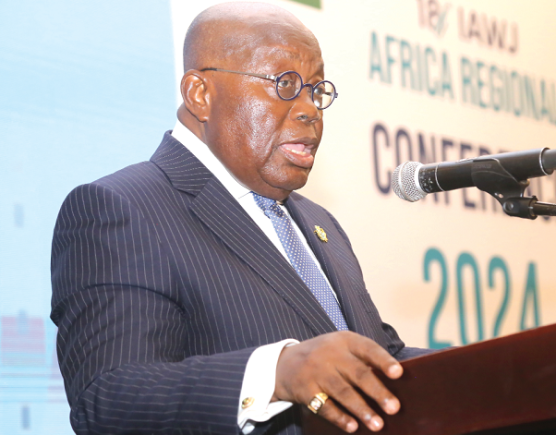
Dismantle barriers to justice - Akufo-Addo challenges women judges
President Nana Addo Dankwa Akufo-Addo has challenged women judges to leverage their legal acumen to dismantle barriers to justice.
The President said as judges and upholders of the law, they had the power to redefine norms and set precedents that protected the vulnerable and marginalised through their judgements.
Consequently, he said, their judgments must echo the principles of fairness, equality and justice.
“Let them (judgements) be a beacon for those in the shadows of fear and oppression. Remember, each decision you make not only affects individuals in your courtrooms, but also sets the tone for what we as a society deem acceptable.“And as we walk towards the future, let us envision a continent where the law does not only punish, but also educates and reforms. A future where our daughters will be judged not by their compliance to outmoded customs, but by their potential to lead and innovate,” he added.
Conference
The President was speaking at the opening of the 18th Africa Regional Conference of the International Association of Women Judges (IAWJ) in Accra yesterday.
The five-day conference, which is being attended by women judges from Nigeria, Tanzania, South Africa, Cote d’Ivoire, Uganda, Togo, Kenya and Ghana, among others, is on the theme: "Combating negative cultural practices in contemporary times: The role of women judges".
The core mandate of the association is to, among others, promote and empower women judges to help uproot gender bias, end discriminatory laws, advance gender-responsive courts, and promote human rights for all.
They would also share experiences, knowledge and 'law-based' approaches to dealing with challenges such as cyber bullying of children, cultural beliefs and fighting sexual offences, poverty and access to justice, among other challenges.
Cultural practices
President Akufo-Addo said negative cultural practices such as female genital mutilation, which had been outlawed in Ghana, were not only an affront to victims, but also a blemish on the collective human conscience.
Fighting such practices, he said, should not only be confined to the courtroom, but must be done through education, awareness and collaborative governance.
“It is in our schools, homes and community gatherings that the foundational beliefs of our next generation are formed,” the President said.
He further said that the government was committed to supporting the judiciary, and in line with that, it set out in 2020, to establish 100 courthouses with residences nationwide.
The President said currently, 79 of such courts had been inaugurated and were in use, adding that the remaining 21 which were at various stages of completion, would be finished before the end of his tenure.
Responsibility
The Chief Justice, Justice Gertrude Sackey Torkornoo, cited a Daily Graphic publication with a headline: “A day in the life of kayayei: The struggles, misery of Bintu, Ramatu,” and said judges were in a privileged position to apply the law in a manner that sent a signal of abhorrence of every form of exploitation, and the promotion of human rights and protection of women from harmful cultural and traditional practices.
“In our various judiciaries, our voice as a powerful caucus should be strong in the advocacy for the introduction and implementation of policies that promote the rights of women and the vulnerable in society,” the Chief Justice said.
Justice Torkornoo said since assuming office, she had through the Chief Justice’s mentoring programme, deepened an initiative which was introduced in 2018, by establishing more clubs in senior high schools.
Barriers
In a speech read on her behalf, President of the IAWJ, Justice Binta Nyako, said women still faced significant barriers in accessing justice as a result of cultural and discriminatory norms and systemic biases.
In the speech read by the West and South Africa Director of the association, Justice Roli Harriman, the president said as leaders, it was incumbent on the participants to challenge those obstacles and strive for a more inclusive and equitable legal system.
For his part, the Attorney-General and Minister of Justice, Godfred Yeboah Dame, said research had shown that women were less susceptible to corruption than men.
